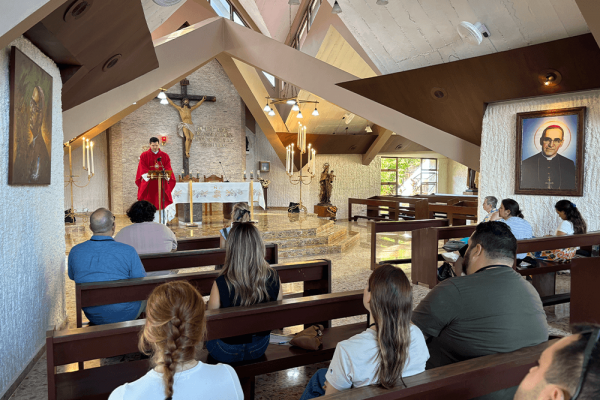The United Methodist Church voted this week to approve a petition affirming a right to abortion and pledging “solidarity with those who seek reproductive health care.” The vote was part of the UMC’s 2020 General Conference, which was delayed until 2024 because of the COVID-19 pandemic.
The petition, passed on Monday, “upholds a person’s right to an abortion after informed consideration with their family, medical practitioners, pastor, and other pertinent counsel.” It also denounces abortion bans.
Later in the week, however, the General Conference passed its revised social principles, which contain more cautious language on abortion. In contrast to the petition, the principles “urges” people considering abortion “to engage in searching, prayerful inquiries into other alternatives.” “Our commitment to the sanctity of human life makes us reluctant to condone abortion. We unconditionally reject it as an acceptable means of birth control or a mechanism for gender selection and other forms of eugenics.” The principles also affirm the right to gynecological care, recognize the economic factors that limit access to care, and support in vitro fertilization.
Supporters say both the petition and revised social principles reflect movement toward the intersectional concerns of the reproductive justice movement — a holistic vision for women and children’s health care that emerged from Black women’s efforts to address racial and economic injustices often overlooked in reproductive health care.
“The politicized environment in the United States has muddled the water on how we talk about reproductive justice,” said Lisa Jones, an organizer and UMC conference delegate from Milwaukee. Abortion, she said, tends to overshadow the broader issues of what it means to support pregnant people and families. The revisions to the social principles affirm the broader commitment to reproductive justice, she said, even if there’s still some hesitation on some of the language surrounding abortion. “We have to have a starting point,” she told Sojourners.
Despite the starting point, some reproductive justice advocates raised concerns about language that remains in the social principles, such as the stated opposition to “partial-birth abortion.” The inaccurate term is sometimes used by anti-abortion advocates to refer to dilation and extraction, a procedure performed in the second trimester.
“‘Late-term’ or ‘partial-birth abortion’ is not a medical term. It is a political term,” said Dr. Kathy Hartke, a retired OB-GYN and alternate delegate from Wisconsin. “It’s not happening, so we don’t need to oppose it.”
Hartke said that adopting political language designed to stigmatize abortion is harmful and minimizes the care and consideration she has seen firsthand as a provider. “I know that the work I did to care for those women was absolutely the right thing to do.”
In addition to affirming a right to abortion, Hartke said the strongest language was the petition’s statement that, “State and federal laws and regulations prohibiting abortion violate a person’s right to the full range of reproductive health care, and, potentially, life.”
The new language is part of a larger update to the social principles, which also included lifting bans on gay clergy and LGBTQ+ weddings and more inclusive language for the LGBTQ+ community, the primary issue that recently led more than 7,600 churches to disaffiliate from the UMC. The United Methodists were previously the nation’s second largest Protestant denomination. Most of the 7,600 churches joined the Global Methodist Church, a newly formed denomination with more conservative theology.
While the disaffiliation has been difficult, even grievous for many churches, advocates acknowledged it has opened up new possibilities for the denomination to move toward justice and inclusion for those who had been excluded.
“The traditionalists who caused harm and un-Christian behavior are gone and the majority of the people who are at the General Conference are here to build the church,” Jones told Sojourners. She said it was a “spirit-filled conference” and noted that other traditionalists, who didn’t cause harm, remained in the conference.
The UMC still includes many conservative congregations globally and in the U.S. The denomination has congregations in countries and states where reproductive health care — especially abortion — is heavily regulated. Lovett Weems, director of the Lewis Center for Church Leadership at Wesley Theological Seminary in Washington, D.C., told Religion News Service that it “would be a mistake to say that the denomination in the U.S. has moved to being virtually uniformly progressive.”
One of the priorities of those in favor of more support for reproductive justice, including abortion access, was promoting a regionalized approach to social issues. This would allow support for reproductive justice to adapt to its social context. “We need to stop telling everyone else what to do,” Hartke said. Hartke said the approach would allow regional conferences to take explicit stances supporting abortion access, while leaving room for conferences that wish to take a more conservative approach.
Correction: This story was corrected on May 1, 2024 to clarify that a petition was passed but the vote on revised social principles pertaining to abortion is still forthcoming. Sojourners erroneously reported that the revised social principles had already passed and erroneously reported the text of the petition as that of the revised social principles.
Editor’s note: This story was updated on May 3, 2024 to reflect that the conference delegates approved the UMC’s revised social principles.
Got something to say about what you're reading? We value your feedback!







